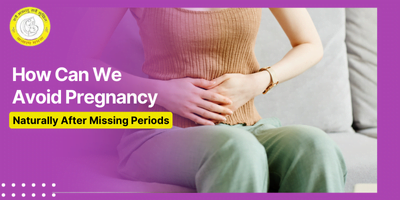How Can We Avoid Pregnancy Naturally After Missing Periods

Missing a period can cause concern about a potential pregnancy. Methods to Avoid Pregnancy Naturally may not be foolproof, but understanding your fertility cycle and using techniques can help manage pregnancy.
This blog will help you in learning about Natural Ways to Avoid Pregnancy and highlights the value of seeking individualized guidance from healthcare specialists.
Understanding Your Pregnancy Cycle
In this Article
Knowing when your cycle is ovulating is important for controlling the risk of pregnancy. This cycle, typically around 28 days but varying per individual, includes:
1. Menstrual Phase
Marks the beginning of the cycle with the shedding of the uterine lining, resulting in bleeding. The body gets ready for a new cycle during this time.
2. Follicular Phase
The second stage of the reproductive cycle, which is indicated by the growth and maturation of ovarian follicles that produce eggs.
3. Luteal Phase:
The stage of the reproductive cycle that ends with the development of the corpus luteum and the release of hormones that prepare the uterus for possible fertilization egg implantation.
How Can We Avoid Pregnancy Naturally?
Pregnancy risk can be managed with the use of a few Natural Ways to Avoid Pregnancy, but they are not foolproof and need careful monitoring. Here are some strategies:
1. Natural Family Planning Methods
Natural Family Planning (NFP) involves tracking your menstrual cycle and observing bodily signs to Avoid Pregnancy Naturally. Key techniques include:
Cycle Tracking
To determine when you are fertile, track the duration of your menstrual cycle and stay clear of sexual activity throughout these periods of time. For precise tracking, make use of calendars or applications.
Basal Body Temperature (BBT) Monitoring:
Track your BBT every morning before getting out of bed. A temperature rise indicates ovulation. Regular tracking helps identify fertile days.
Cervical Mucus Observation
the mucus becomes clear and stretchy, signaling peak fertility.
While NFP can be effective, it requires careful monitoring and may not be suitable for everyone. Consulting a healthcare professional can help determine if NFP is appropriate and how to track effectively.
2. Home Remedies to Avoid Pregnancy
Some explore home remedies involving natural ingredients:
Fruits and Vegetables
Foods like papaya, pineapple, ginger, fennel, carrots, and sweet potatoes are sometimes believed to have contraceptive properties, but there’s no scientific evidence supporting their effectiveness.
Herbs
Although there is a history of using traditional treatments including cotton root bark, neem, and queen anne’s lace, there isn’t much solid study on them.
These remedies offer a way to avoid pregnancy naturally but are not reliable substitutes for medically proven methods. Always consult a gynecology specialist before using them to ensure safety.
3. Herbal Birth Control Methods
Herbal birth control methods use plants and herbs believed to impact fertility:
Neem
Research is needed to determine the safety and efficacy of neem, which has been traditionally utilized for its spermicidal qualities.
Queen Anne’s Lace
Also known as wild carrot, its seeds have been used for centuries but lack substantial evidence.
Herbal methods can be part of a broader strategy but are not substitutes for proven methods. Consulting a healthcare provider is crucial before trying herbal remedies.
4. Emergency Contraception
Emergency contraception (EC) refers to the use of hormonal contraceptives, such as the morning-after pill, and non-hormonal contraceptives, such as the copper intrauterine device (IUD), to prevent pregnancy following unprotected intercourse. The effectiveness of EC varies based on the method used and how soon it is taken after intercourse.
EC is not intended for regular use but rather for emergency situations. It’s important to consult with a healthcare professional to determine the most suitable option for your individual circumstances and needs.
5. Lifestyle Changes
Making certain lifestyle changes supports overall health and fertility:
Balanced Diet
A diet rich in fruits, vegetables, whole grains, and lean proteins supports hormonal balance and overall health.
Avoiding Alcohol and Smoking
Alcohol and smoking can negatively impact fertility. Reproductive health can be improved by limiting or not using these substances.
Maintaining a Healthy Weight
Achieving and maintaining a healthy weight supports hormonal balance and reproductive health. The presence of both overweight and underweight can impact fertility.
Stress Reduction
High stress levels can impact fertility. Stress can be managed by including meditation, yoga, and deep breathing in your routine.
While these changes can support reproductive health, they should not be relied upon as the sole method of contraception. Discussing options with a healthcare professional ensures you select the best methods for your needs.
When to Consult a Gynecologist
A lifestyle change alone may not be enough for contraception, even though it supports overall health. Discuss contraceptive options with your doctor to find what works best for you.
So, if you are looking the best Gynaecologist Hospital in Patna, then Diwya Vatsalya Mamta IVF is your one-stop destination. Diwya Vatsalya Mamta IVF specialist will advise and help detect irregular periods problems, and she will also deliver the right treatment for annual check-ups, pregnancy planning, menstrual issues, sexual health concerns, menopause symptoms, pelvic pain, and breast exams. Regular visits are crucial for maintaining reproductive health and addressing concerns.
Conclusion
Knowing How to Avoid Being Pregnant Naturally, the first step after not getting your period is to understand your cycle and try different approaches. Although these methods can reduce the chance of becoming pregnant, they frequently need careful monitoring and might not be 100% effective.
Speaking with a gynecologist will guarantee that you select the best course of action for your particular situation, improving your reproductive health overall. A complete strategy for pregnancy prevention combines Natural Ways to Avoid Pregnancy with expert advice.
FAQs
What to eat to avoid pregnancy after 1 month?
Unripe papaya naturally contains an enzyme called papain, which may promote menstruation and prevent uterine development. Due to its ability to promote menstruation and prevent pregnancy, ginger tea is said to have contraceptive advantages.
How to prevent pregnancy naturally after a period miss?
The use of NFP, basal body temperature monitoring, cervical mucus observation, and fertility cycle monitoring are examples of natural techniques. If you want individualized help, get advice from a medical specialist.
Does papaya affect pregnancy?
Enzymes found in unripe papaya may influence pregnancy and cause uterine contractions. When consumed in moderation, ripe papaya is typically safe, but for specific guidance, it’s better to speak with a healthcare provider.



